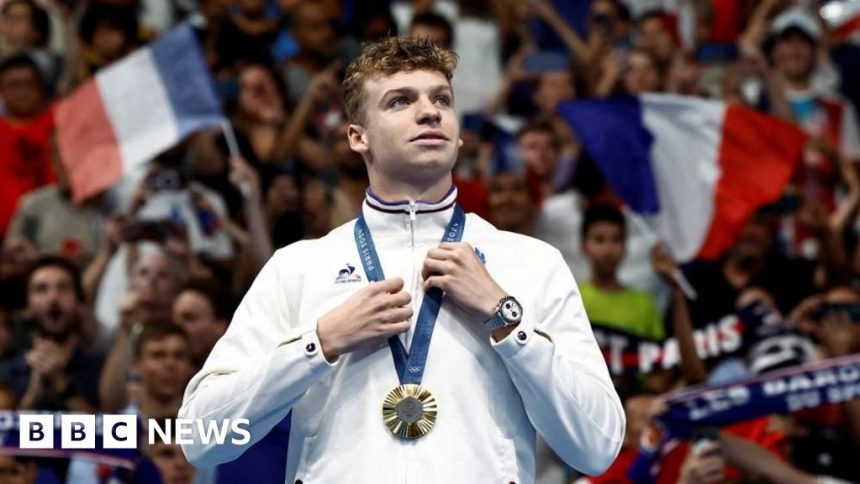‘Marchand-mania’ inspires French unity – but for how long?
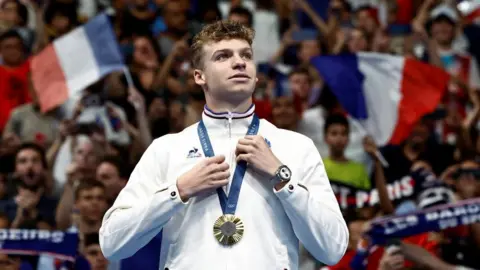 Reuters
ReutersSwimming sensation Léon Marchand appears to be inspiring a little of the French ideal of “fraternité” that may have felt in short supply in the host nation during a time of sharp recent political division.
A home crowd will again cheer him on in the 4 x 100m medley relay in Paris’s La Défense Arena on Sunday, as he eyes his fifth gold medal of these Games.
His current haul already beats the achievement of any other French competitor at a single Olympics, and has seen the 22-year-old compared to American legend Michael Phelps.
More fanciful is an idea floated by political cartoonists and social media users, who joke that Marchand should be chosen as prime minister following last month’s bitterly-contested snap election, in which a left-wing coalition ultimately prevailed over the far-right.
The gags show that France is looking to “laud someone who seems so dedicated and sincere in his sport, and way of life,” explained Andrew Hussey, a historian of French culture, who added that many saw Marchand as representing a contrast to the country’s politicians.
The athlete’s heroics were proving a welcome distraction during the crisis, said Parisians lounging on the grass in one of the city’s parks, watching the sporting action on a big screen.
“We don’t want to think about the problems,” said a woman named Thanh. “We don’t want to think about the division in the country.” The swimmer had helped to “smooth everything”.
Louis agreed: “When Marchand was racing, it was the most important thing for the country for a while.”
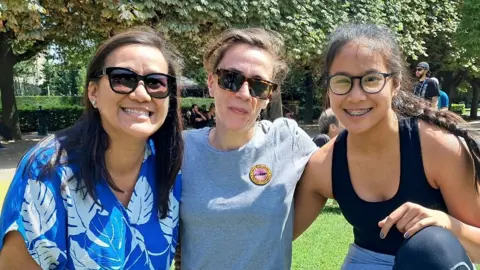
Politics seem to be largely on hold for the Games, after President Emmanuel Macron said negotiations over the formation of a new government would have to wait until after the Paralympics.
Mr Macron is among those who have been to roar on Marchand in person. On Friday night, the arena was filled with deafening roars of “allez” (“go”) each time the golden boy’s swimming cap bobbed above water as he powered to glory in the 200m medley.
But anyone seriously hoping that Marchand will stick his head above the political parapet looks likely to be disappointed.
The swimmer, who trains in the US, has avoided wading into public debate. That contrasts with another national hero, football star Kylian Mbappé, who memorably used a Euro 2024 press conference to urge a vote against the far-right.
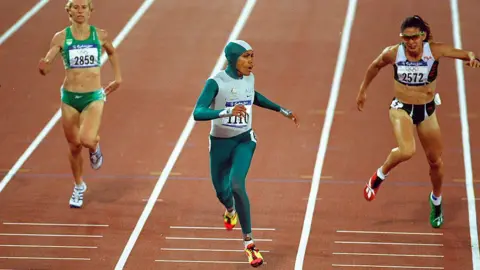 Getty Images
Getty ImagesThe tradition of a population galvanising around a hero is as old as the Games itself, according to Philip Barker, the editor of the Journal of Olympic History.
Some host nations’ sporting heroes have inspired lasting change, Barker said.
He cited Cathy Freeman, an Aboriginal runner who celebrated her 400m sprint win in Syndey in 2000 with the Australian and Aboriginal flags, as prompting an spirit of inclusivity from Australians towards the indigenous population “that hadn’t really existed before”.
During the 2012 Games in London, Jessica Ennis-Hill, Greg Rutherford and Mo Farah were lionised after bagging a quick flurry of golds in what was quickly dubbed “super Saturday”.
But the UK’s “golden era” of solidarity was fairly short-lived, Barker said, pointing to the political divisions that characterised the Scottish independence and Brexit referendums in the following years.
One specialist in contemporary French politics agreed that the unifying effect of Marchand and his fellow French medallists was unlikely to last for long.
“We can expect an immediate return to a fractured political field and a disgruntled electorate as soon as the Games are over,” said Emile Chabal, a professor of contemporary history at the University of Edinburgh.
“No amount of Marchand-mania – and we’ve seen this before with great French sporting stars like [Zinedine] Zidane or Mbappé – will stop that,” he said.
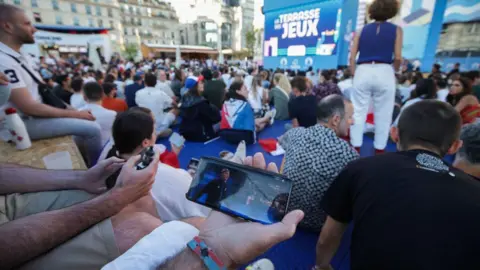 Getty Images
Getty ImagesFor now, at least, Marchand’s compatriots are glued to his exploits – so much so that even those who have paid good money for Olympic tickets have spent some of those events watching his races on their phones.
That applied to one Parisian in the fan park, Audrey, who admitted she had torn her eyes away from a volleyball match to witness Marchand claim one of his golds on her screen.
Although France had found a new hero, it was possible that “maybe next week there will be another Marchand”, Audrey pointed out. And at any rate, Marchand was just a part of something bigger.
“It’s not just about him,” she said, citing the “amazing” opening ceremony.
France should be “very proud about what we are showing to the world” with the Olympics, she said.



